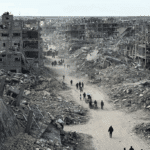Bunia, 18 October 2013 – Martin Causin coordinates the Avocats Sans Frontières (ASF) Bunia office in Ituri (Eastern Province), in the North-East of the Democratic Republic of Congo (DRC). Along with his team, the 34 year-old Belgian, who has a legal background, provides support to access to justice projects. He tells us about the commitment of Congolese victims, lawyers and judges in fighting international crimes.
Grave violations of human rights are still taking place in the East of the DRC, especially near Goma. Is the situation in Ituri equally unstable?
Yes. Militias are active and perpetrate international crimes, such as rape, looting and killings. Under those circumstances, the fight against impunity of the perpetrators sends a strong signal that contributes to ending these atrocities and gives victims hope.
Morgan’s militia is accused of having committed a series of atrocities against the population of a village located in a natural reserve in 2012. At least 67 victims have been identified. What actions has ASF taken in connection to those events?

After Congolese authorities arrested some members of this militia, the case was tried before the Military Tribunal in Bunia in first instance and the Military Court in appeal, to decide on the charges against three accused militia members. ASF and local NGO Fédération des Jeunes pour la Paix Mondiale (FJPM) visited the village where the atrocities were perpetrated to gather testimonies and encourage victims to appear before the courts. As a result, 27 victims agreed to participate in the proceedings, a courageous act to undertake.
Those proceedings have taken place in mobile courts, a mechanism developed by ASF which allows to bring justice closer to the people…
Absolutely. In order for these trials to take place, the tribunal and the different parties had to be moved to the site: five judges, a prosecutor, a court clerk, the victims and the suspects imprisoned in Bunia. A real challenge from a logistical point of view – almost 200 km of dust roads – as well as from a security point of view, given the tensions in the area. Through a good cooperation between the Congolese judicial authorities, the United Nations (notably MONUSCO) and ASF, these trials have been made possible.
Does ASF represent victims in the proceedings?
Yes, and free of charge. Two lawyers of the Kisangani Bar Association and members of the ASF pool on international criminal justice in DRC are in charge of this case.
What is your assessment of the case at this stage?
Despite some irregularities, the proceedings have met legal standards and the victims assisted in Court by ASF have received effective protection. Another positive point is the reference to the Rome Statute in all the Court’s pleadings and decisions. The fact that Congolese military jurisdictions apply international treaties in matters of war crimes and crimes against humanity is a real step forward in the administration of justice.
Cover photo: The ASF team in Bunia, including Martin Causin (l.), supports the fight against impunity for international crimes © ASF



